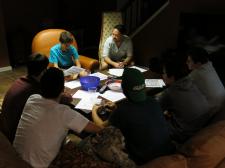Coming To The Right Answer By Themselves: Talking With Boys About Sexual Assault

"In the basement of a suburban Philadelphia home, half a dozen high school freshman boys recently met to munch on chips and pretzels — and to talk about sexual assault in the wake of the Brett Kavanaugh confirmation hearings.
A Jewish organization called Moving Traditions brought them together as part of its programs to encourage teenagers to talk about this and other difficult issues.
Volunteer group leader Cody Greenes, 35, introduced the week's topic by asking the boys to raise their hands if they've heard of the #MeToo movement. Then Greenes led a discussion about the historical power differences between men and women and how that can play out when it comes to sex.
After talking about the larger issue, Greenes posed the question: 'Do we believe that verbal consent is necessary?'
Most of the boys said yes, but one, David Levin, argued it isn't always simple. He described a situation on a bus where both people already said they're interested in each other and the girl purposely sat next to the boy.
'And then she, like, puts a blanket around you two and lays down, and cuddles into you and grabs your hand so you can hold hands and stuff,' says Levin, who suggested those are signs of consent.
Complicating the discussion, the boys talked about a case where verbal consent may not be enough — say, if a movie producer asks a subordinate to have sex.
Arriving at the right answer on your own
Moving Traditions founder and CEO Deborah Meyer says the goal is not to tell teens how they should behave, but to give them the space and guidance to arrive at the right answer with their peers.
'We help guys uncover the tenderness and the connection and the joy in themselves, as a human being, and develop for themselves a sense of ethics and values and responsibility,' Meyer says."

